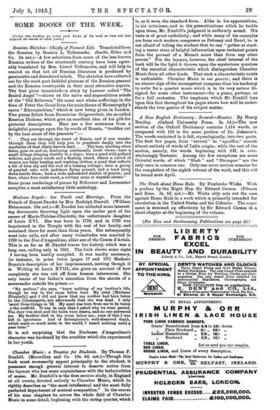SOME BOOKS OF THE WEEK.
[Under this heading ve ,,dire such Locks of the week as 1.5es not been sescrted for renew in other forms.]
Co. 5s. net.)—A few selections from some of the less-known Russian writers of the nineteenth century have been agree- ably translated by Mrs. Lionel Tollemache, and will help to remind us that not all Russian literature is produced by pessimistic and disordered minds. The sketches here collected are for the most part faithful pictures of the Russian peasant and the Russian countryside in their most attractive aspects.
The first piece translated—a story by Leescov called " The Sealed Angel "—shows us the naïve and superstitious minds of the " Old Believers," the same sect whose sufferings in the time of Peter tbe Great form the main theme of Moussorgsky's opera " Khovantchina," which is now being given in London. Two pieces follow from Demetrius Grigoroviteh, the so-called Russian Dickens, which give an excellent idea of his gift for pictorial descriptions. Here are a few sentences from a delightful passage upon the by-roads of Russia, "trodden out by the bast shoes of the peasants " :—
". . . They cut through the heart of Russia, and if you wander through them they will help you to penetrate deeply into the mysteries of that dimly-known land. . . The lane, meeting other Lanes, goes on and on, disclosing continually fresh views—here a small village clinging timidly to a slope ; here a pond with pollard willows, and green weeds and a floating stand, where a crowd of women are busy beating and washing clothes, a pond that reflects a bit of blue sky and the roof of a leaning cottage ; here a group of gnarled oaks with jackdaws flying around, and a herd lying down beside them ; here a wide unbounded stretch of prairie; and here, where four roads meet, a solitary cross or wayside shrine."
Some prose renderings of poems by Nekrasov and Lermontov complete a most satisfactory little anthology.


















































 Previous page
Previous page